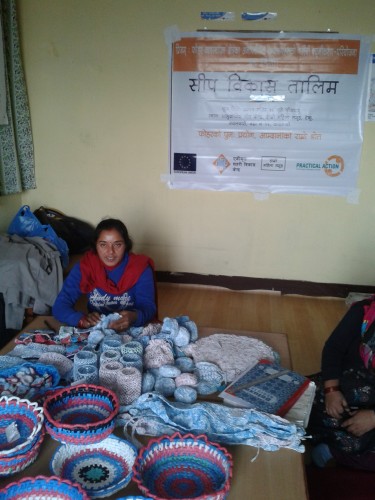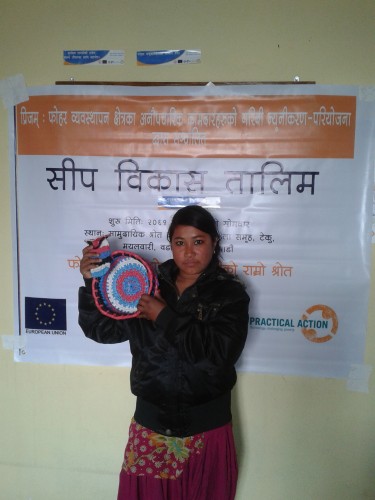By Srijana Devkota
Project Manager
Practical Action Nepal
Trash turns into cash
Practical Action through the PRISM (Poverty Reduction of Informal Workers in Solid Waste management Sectors) project recently organised a 15 days entrepreneur’s skill development training on recyclable waste (plastic) to female waste pickers to enhance their entrepreneurship capacity in the Kathmandu valley as most of the waste enterprises in Nepal are owned by men. During the training session, the participants learned to make purses, mobile cases, pen holders, fruit basket, key rings and bath rubber out of the plastic recyclable waste they collected.
Upon completion of the training the initiation is tested in one of the community’s groups called “Hamro Mahila Samuha”, meaning “Our Women Waste Pickers Group.”
“I have learned to reuse the wastes in a productive way that has helped me to increase my income. I will continue to apply this skill for my livelihood in future,” says Sabita Achayra (27) of “Hamro Mahila Samuha”.
Another participant Bimala Bakhati (18) says, “We do not need big investment to work with such small enterprises. I learnt that we can take benefit from the waste we collected which easily turns into cash. The earning from the product helps us to support our family expenses. I am personally interested in making “key ring”.
Sarita Joshi, trainer shares her experiences, “This is the first time I got opportunity to provide this training to female waste workers. I am happy to see the enthusiastic participants and their activeness during the training. I can myself buy the products they make for my business. They can start this from their home and later on I hope they will be able to start their own enterprises”.
Active Women Group
“Deukhel Mahila Kawad Samuha” is a model group of women waste pickers in Kathmandu Valley. The objective of the group is to strengthen the women waste workers in achieving social recognition and supporting their work. The project is facilitating the group by providing social protection schemes like women’s development, child protection, preventive healthcare schemes and saving and credit mobilization for social safety measures covering ill health, and contingencies over improving incomes and working conditions.
The project has admitted 12 children of these waste pickers’ groups in Shree Azad Lower Secondary School, Deukhel, Kathmandu. The group members are also providing 20 percent financial support for the education of their children on top of 80 percent provided by the project. Similarly, the project is also developing confidence and awareness among the members with regards to conducting informal education. As a result, the beneficiaries are friendly and supportive to each other and have regular group interactions and communication within the group.
Child Education and Trust Building
Mrs. Bimala Devi Poddar, a woman waste picker who had a negative perception towards the project and group formation to implement the activities in the beginning. Her perception towards the project has changed after regular facilitation and awareness raising campaigns, psychosocial counseling, observation and group management training conducted by the project. As a result, she is now an active member of the “Boudha Mahila Group”. As part of the social protection scheme, her daughter Simran Kumari has been financially supported for school enrollment, books and uniform by the project. “Once I understood the objective of project and its benefit to us, I joined the ‘Boudha Mahila Group’. My daughter, Simran is being supported for her education through the project. I would like to thank the team for supporting us,” said Bimala Devi Poddar.
Tweet



